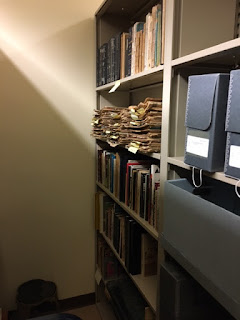Special Collections Internship at the University of Central Florida
Week 2: The Man behind the Research!
Learning About the Man!
 |
| Fig. 1. Book and Paper Collection of Jose Guerra Alemán. (Image Courtesy of Samuel Ortiz.) |
 |
| Fig. 2. Notes and Paperwork of Jose Guerra Alemán. (Image Courtesy of Samuel Ortiz.) |
Even though I worked in organizing his work, I did not get to know who he was rather I was seeing more of what he researched and studied for his entire life. I had to do some outside research on him such as looking at “About Author” section from his own book to get his background information. He lived and breathed Cuba. He was proud of his heritage and his history. It was in his blood. His grandfather was Jose Braulio Alemán, the general of War of Independence and member of the general staff of Máximo Gómez who was Secretary of War in the last government of Cuba. Then, his uncle, Jose Manuel Alemán was also major in Cuba’s government. His political position was in the Ministry of Education and according to Maria Yvonne Dupuy, widower of Alemán, Jose Braulio Alemán was supportive and worked in education. He also held a position in Ministry of Education, like father like son. Understanding his family tree allows me to see why he was so connected to Cuba; aside from being Cuban, his past generations were in the forefront and prominent leaders in the fight for freedom.
 |
| Fig. 3. Photo of Jose Braulio Alemán. (Image Courtesy of ecured.cu.) |
 |
| Fig. 4. Photo of Jose Manuel Alemán. (Image Courtesy of ecured.cu.) |
After some research, I found out that Jose Guerra Alemán was a journalist and he worked for the newspaper company called Él País at the age of 16. By the time he was 20 years old, he enrolled in the U.S. military where he was deployed in the Pacific as the 35th Division of Infantry. His connection to the military reminded me of the Veteran Legacy Project that the history department of the University of Central Florida is doing under a grant from the U.S. Department of Veterans Affairs. Here is a veteran who contributed in providing the public with an awareness of Cuba’s history. He is important to follow him from where he came from and the journey he took until his death because you get to see his personal life as well. His work shows that he did a lot of traveling and exploring of the world. Furthermore, in 1947, he went back to Cuba and founded CINEPERIODICO, a business that reached notoriety in the presentation of news and current affairs through films and documentaries. His engagement of the political news of Cuba and nations around enticed and gave him an opportunity to climb the Mountains of Sierra Maestra in the providence of the East of the island of Cuba to interview Fidel Castro. He clearly was in the history and in a good part of the action during this time, the revolutions of Cuba.


Comments
Post a Comment